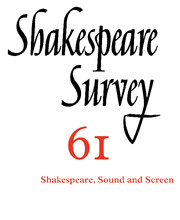Book contents
- Frontmatter
- Sarah Siddons, theatre voices and recorded memory
- Playing with Shakespeare’s play: Branagh’s Love’s Labour’s Lost
- Bottom and the gramophone: Media, class and comedy in Michael Hoffman’s A Midsummer Night's Dream
- Maurice Evans’s Richard II on Stage, Television and (Almost) Film
- Richard II on the Screen
- ‘Where Lies Your Text?’: Twelfth Night in American Sign Language Translation
- ‘This uncivil and unjust extent against thy peace’: Tim supple’s Twelfth Night, or what violence will
- ‘There’s no such thing’: nothing and nakedness in Polanski’s Macbeth
- Ghosts and mirrors: the gaze in film Hamlets
- ‘Ben, it’s a terrible thing to hate your mother’: mind control in Hamlet and The Manchurian Candidate
- Channelling the ghosts: the Wooster Group’s remediation of the 1964 Electronovision Hamlet
- Listening to Prospero’s Books
- Lend Me Your Ears: Sampling BBC Radio Shakespeare
- An Age of Kings and The ‘Normal American’
- Shakespeare and British Television
- A Local Habitation and a Name: Television and Shakespeare
- Paying attention in Shakespeare parody: from Tom Stoppard to YouTube
- Madagascan will: cinematic Shakespeares / transnational exchanges
- Still life? Anthropocentrism and the fly in Titus Andronicus and Volpone
- Riddling q1: Hamlet’s mill and the trickster
- ‘Speak, that I may see thee’: Shakespeare characters and common words
- Who do the people love?
- A Partial Theory of Original Practice
- Shakespeare Performances in England, 2007
- Professional Shakespeare productions in the British Isles, January–December 2006
- The Year's Contributions to Shakespearian Study 1 Critical studies
- 2 Shakespeare in performance
- 3a Editions and textual studies
- 3b Editions and textual studies: The RSC Complete Works
- Index to Volume 61
Still life? Anthropocentrism and the fly in Titus Andronicus and Volpone
Published online by Cambridge University Press: 28 November 2008
- Frontmatter
- Sarah Siddons, theatre voices and recorded memory
- Playing with Shakespeare’s play: Branagh’s Love’s Labour’s Lost
- Bottom and the gramophone: Media, class and comedy in Michael Hoffman’s A Midsummer Night's Dream
- Maurice Evans’s Richard II on Stage, Television and (Almost) Film
- Richard II on the Screen
- ‘Where Lies Your Text?’: Twelfth Night in American Sign Language Translation
- ‘This uncivil and unjust extent against thy peace’: Tim supple’s Twelfth Night, or what violence will
- ‘There’s no such thing’: nothing and nakedness in Polanski’s Macbeth
- Ghosts and mirrors: the gaze in film Hamlets
- ‘Ben, it’s a terrible thing to hate your mother’: mind control in Hamlet and The Manchurian Candidate
- Channelling the ghosts: the Wooster Group’s remediation of the 1964 Electronovision Hamlet
- Listening to Prospero’s Books
- Lend Me Your Ears: Sampling BBC Radio Shakespeare
- An Age of Kings and The ‘Normal American’
- Shakespeare and British Television
- A Local Habitation and a Name: Television and Shakespeare
- Paying attention in Shakespeare parody: from Tom Stoppard to YouTube
- Madagascan will: cinematic Shakespeares / transnational exchanges
- Still life? Anthropocentrism and the fly in Titus Andronicus and Volpone
- Riddling q1: Hamlet’s mill and the trickster
- ‘Speak, that I may see thee’: Shakespeare characters and common words
- Who do the people love?
- A Partial Theory of Original Practice
- Shakespeare Performances in England, 2007
- Professional Shakespeare productions in the British Isles, January–December 2006
- The Year's Contributions to Shakespearian Study 1 Critical studies
- 2 Shakespeare in performance
- 3a Editions and textual studies
- 3b Editions and textual studies: The RSC Complete Works
- Index to Volume 61
Summary
They say yet againe; But why should a good God take pleasure in so many néedlesse things? For to what purpose serveth the Fly, and such other things? Tell me, wouldest thou like well that thine owne Children should speake such reproach of thy workes? Nay rather wherein doth the Flye anoye thee? ... And this serueth to conuict thee of blockishness, thee (I say) which haddest rather to finde fault with God and with the Flye, then to wonder at the excellencie of him who hath inclosed so liuely a life, so quick a moouing, and so great an excellencie in so little a thing ... Hereby therefore we perceiue, that of all the things which they can alledge, there is none which is not good and behofefull in it self; and that the euilnesse thereof commeth onely through vs, and therefore that the thing hath but onely one Beginner thereof, who is good.
When Titus Andronicus appeared in the first folio of Shakespeare’s plays in 1623 it included a ‘new’ scene, not present in the 1597 quarto and possibly not performed in Shakespeare’s lifetime. This scene comprises eighty-six lines and runs to approximately five minutes’ performance time; its inclusion bears little impact on the textual or performative length of the play, and yet it remains one of the most powerful scenes of the drama. This extraordinary scene, known as the fly-scene, or mad scene, not only poses a significant problem to directors, actors and audiences of the theatre – how do you make a fly audible let alone visible? – but most importantly, ‘What purpose serveth the Fly’? Some six years later at the Globe, Jonson turns this iniquitous insect into a consummate actor: the brilliant and vital force of Mosca. Despite the difference between Titus’s organic matter and the more complex symbolic construction of Mosca, the fly, it seems, can be a theatrical prop, a pre-Cartesian anthropomorphic device, a metaphor and a symbol; whether it is riddled with ‘pretty buzzings’, ‘coal-black’ like the Moor or ‘but a poor observer’ like Mosca, the stage imports the fly to prey on the mind, incite petty violence, defy the madness of mutilation or turn the sinner upon himself.
- Type
- Chapter
- Information
- Shakespeare Survey , pp. 256 - 268Publisher: Cambridge University PressPrint publication year: 2008
- 2
- Cited by



